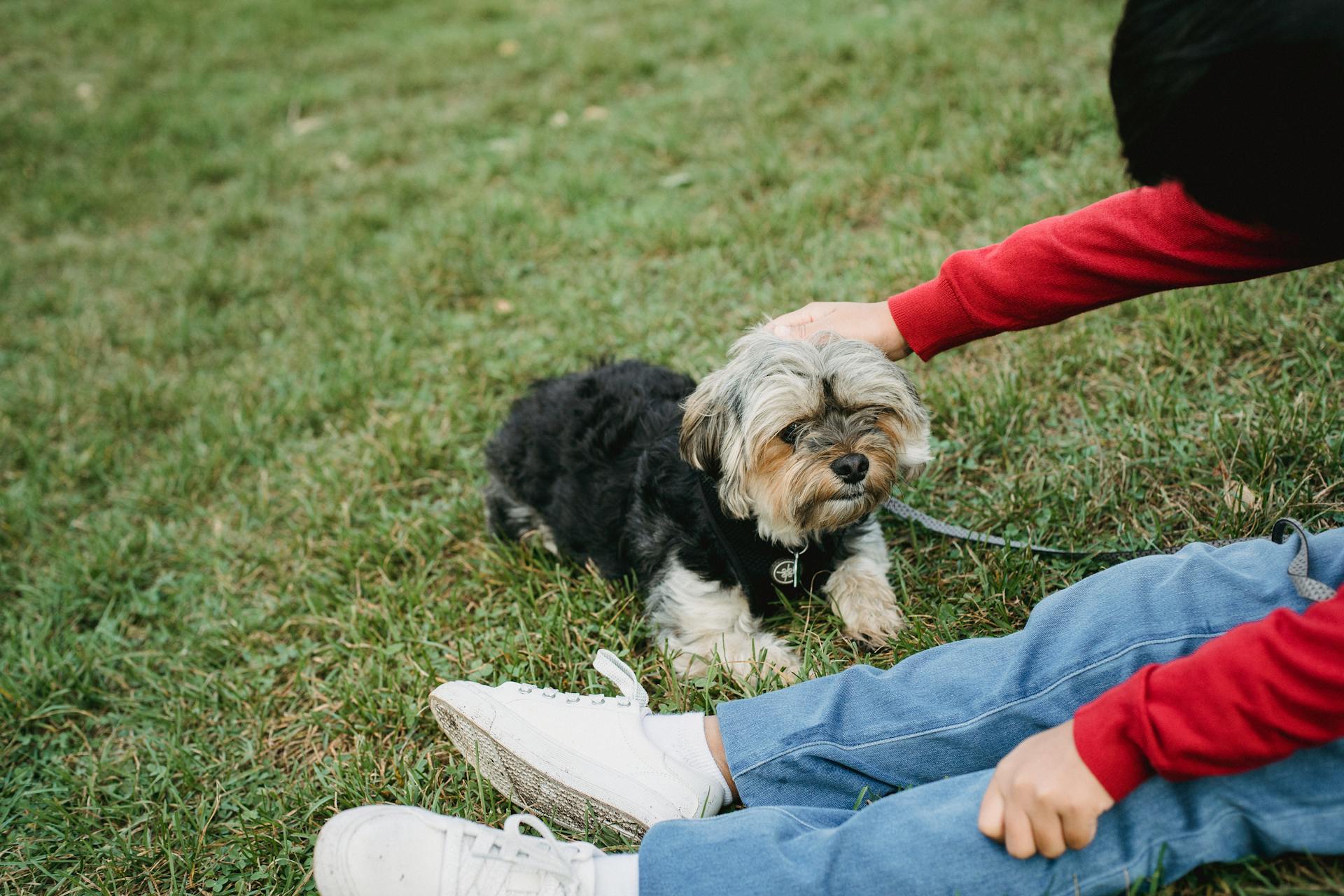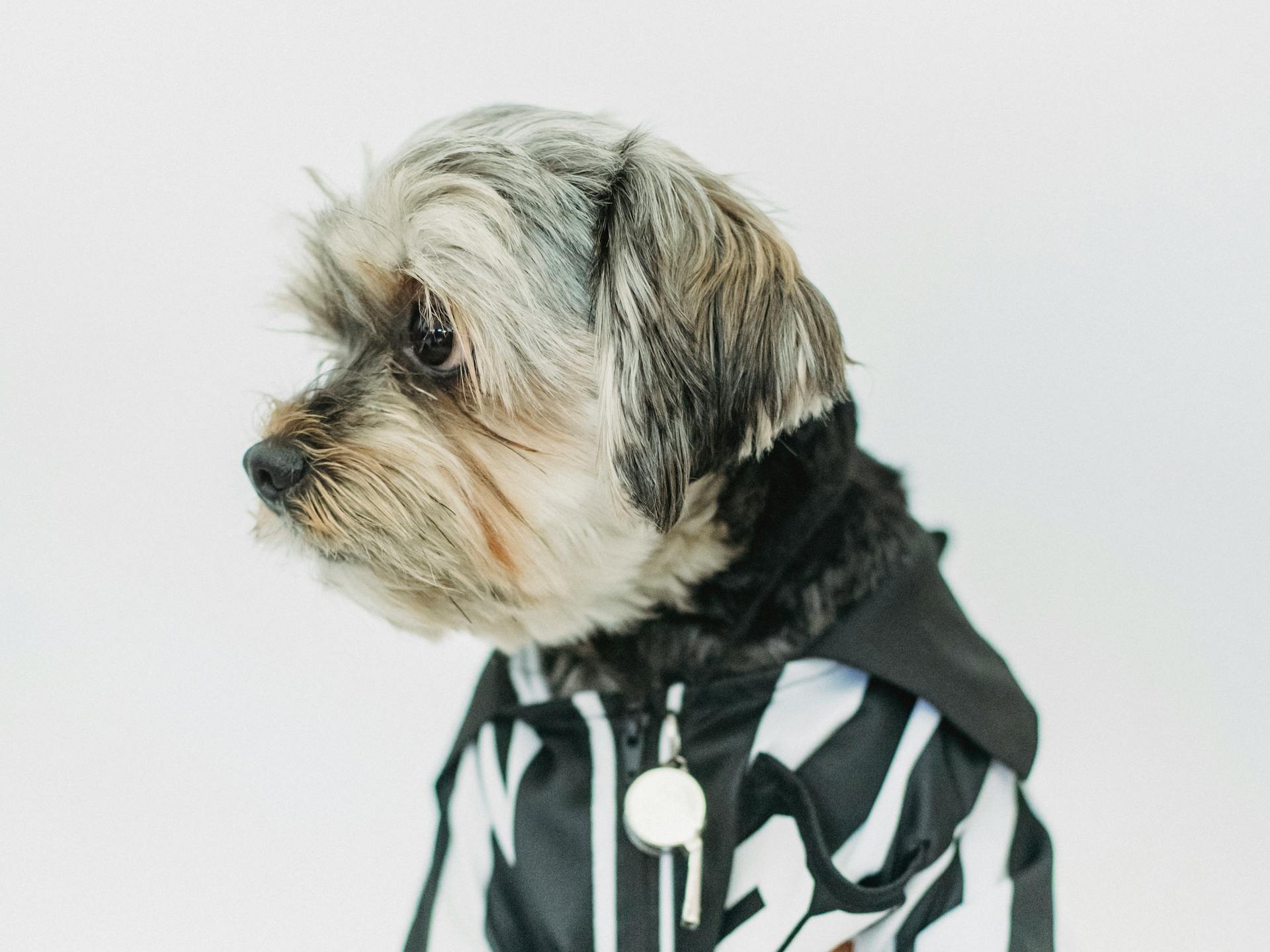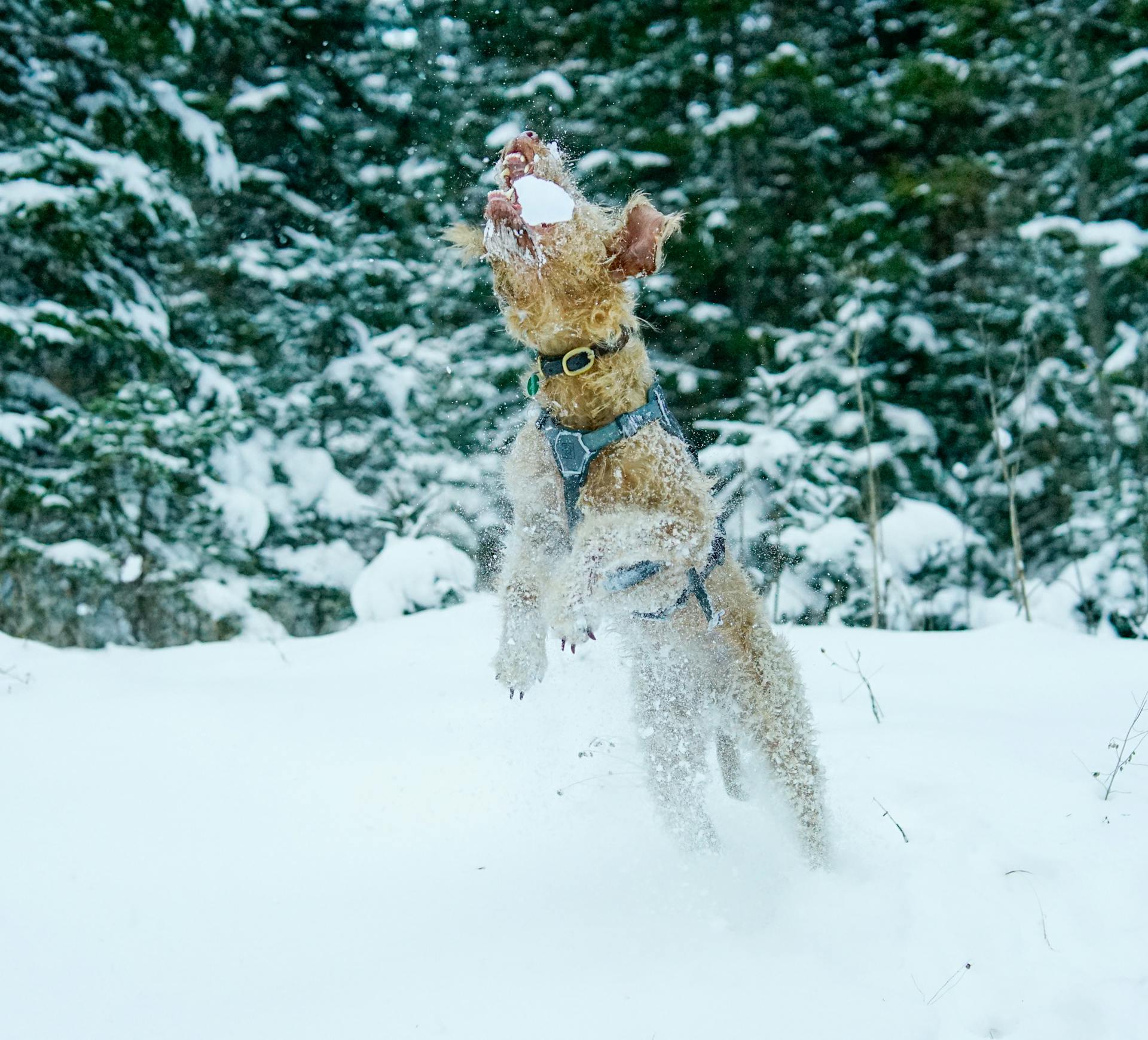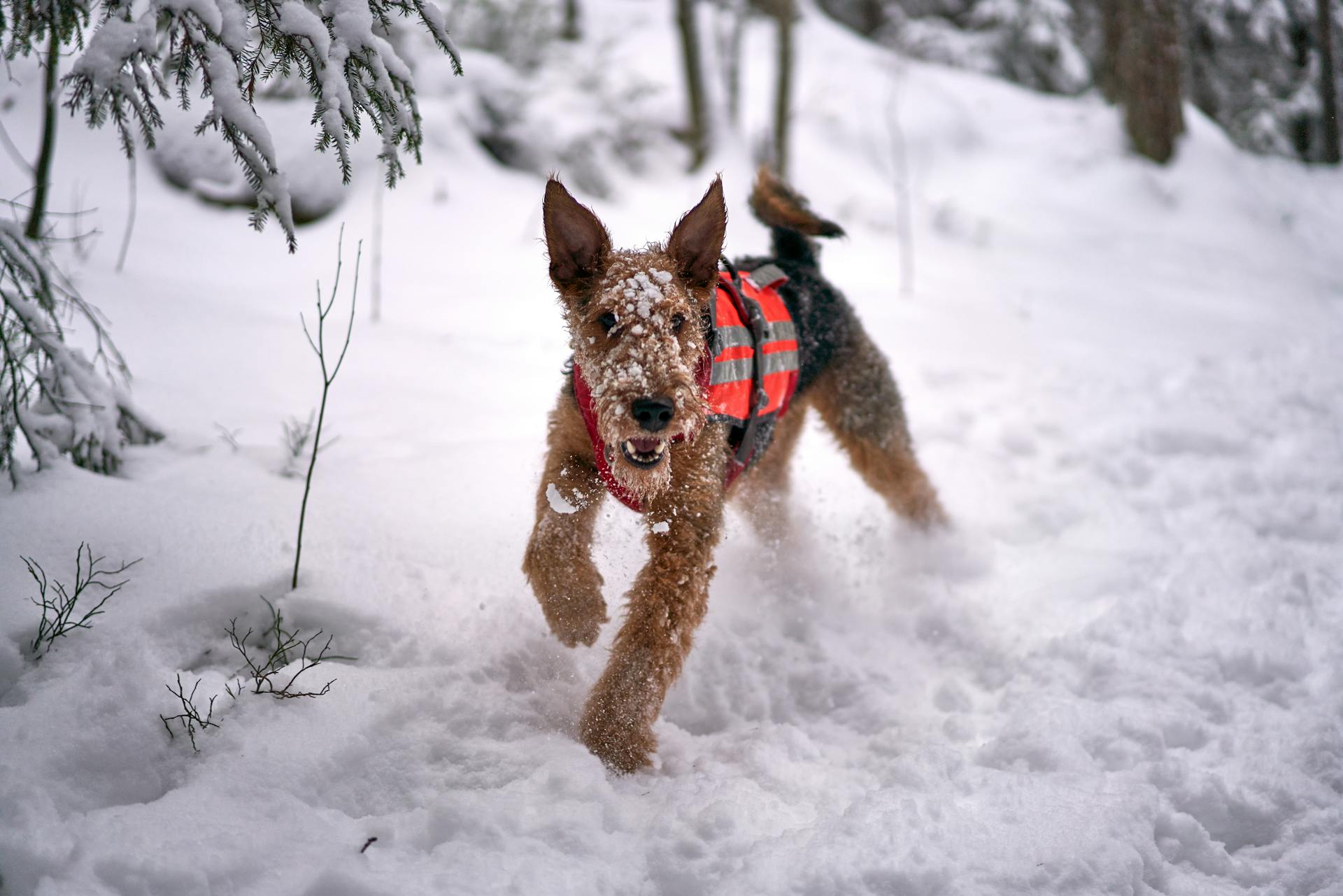
A Yorkshire Terrier underbite can be a serious issue, but with the right care and prevention, you can help your little pup feel more comfortable and confident.
Yorkshire Terriers are prone to underbites due to their small jaw size and crowded teeth. This can lead to difficulty eating and chewing, as well as other dental problems.
Regular dental care is crucial for Yorkshire Terriers with underbites. Brushing their teeth daily and scheduling regular veterinary check-ups can help prevent further issues.
A balanced diet rich in essential nutrients can also help alleviate underbite symptoms.
You might like: Yorkshire Terrier Teeth Falling Out
What Is an Underbite in Dogs?
An underbite in dogs is a dental condition where the lower jaw extends farther out than the upper jaw, causing the lower teeth to overlap the upper teeth when the mouth is closed.
This distinctive facial appearance can be visually identified by the lower jaw extending out farther than the upper jaw when the dog's mouth is closed. In some cases, an underbite may also be accompanied by an overbite, where the upper jaw extends farther out than the lower jaw.
On a similar theme: Boston Terrier Underbite
Underbites can vary in severity, ranging from a mild misalignment that may not cause any noticeable problems to a more pronounced condition that can impact a dog's ability to eat, drink, or properly groom themselves.
Some dogs may also have an asymmetrical underbite, where one side of the jaw is more pronounced than the other, which can be caused by genetic, breed-related, or traumatic factors.
Causes and Development
Yorkshire terriers with underbites often have a genetic predisposition to develop this condition.
Underbites in Yorkshire terriers can be caused by hereditary factors, similar to other short-faced breeds. This means that breeding can play a role in the development of an underbite.
An underbite can also develop due to uneven growth rates between the upper and lower jaws. This may result from poor nutrition or a hormone imbalance.
Trauma, such as a bite to the face or a jaw fracture, can also cause an underbite in Yorkshire terriers.
Retained baby teeth or crowded adult teeth can contribute to the development of an underbite, as they may interfere with the proper alignment of the jaws.
In some cases, an underbite can be caused by an infection during gestation or development.
Readers also liked: Yorkshire Terrier Teeth
Signs of Canine Malocclusion
If your Yorkshire terrier has a malocclusion, you may notice some noticeable signs. One of the most common signs is a noticeable misalignment of teeth.
As the malocclusion worsens, your dog may start to experience difficulty chewing their food. This can lead to other problems, such as avoiding small food chunks.
Difficulty picking up food with their mouth is another common sign of a malocclusion in Yorkshire terriers. This can be frustrating for both you and your dog.
Discomfort or pain when chewing is a clear indication that your dog needs to see a vet. Untreated malocclusions can lead to serious health complications.
Mouth breathing is another sign of a malocclusion in dogs. This can be a sign that your dog is experiencing discomfort or pain in their mouth.
Here are some common signs of a malocclusion in Yorkshire terriers:
- Noticeable misalignment of teeth
- Difficulty chewing
- Difficulty picking up food with their mouth
- Mouth breathing
- Discomfort or pain when chewing
- Food falls out of the mouth when they eat
- Bad breath
- Bloody drool
- Spasming jaw muscles
- Pawing at their face/mouth
- Gum disease
Caring for a Dog with Malocclusion
If your dog has a malocclusion, taking them for their annual vet appointments will help your vet determine if it is worsening and whether the malocclusion requires treatment. Regular check-ups are essential to monitor your dog's condition at home, making sure that no teeth are rubbing against others and causing erosion or puncturing the palate or gums.
If this caught your attention, see: Names for a Yorkshire Terrier
Brushing their teeth often is important to reduce plaque and prevent gingivitis, especially if their milk teeth haven't fallen out. This is a crucial step in maintaining your dog's oral health.
In some cases, extraction of these teeth is the treatment of choice. Taking them for professional teeth cleanings is also essential to keep their teeth and gums healthy.
If your dog's mouth is overcrowded with teeth, it can lead to a range of problems, including pain, discomfort, and difficulty eating. This is why regular dental care is vital to prevent these issues from arising.
Dogs that have underbites may require more at-home, preventative dental care, including daily tooth brushing with veterinary-specific toothpaste. This can help prevent dental disease and keep their teeth and gums healthy.
However, even with regular brushing, your dog may still need a dental cleaning to remove tartar and plaque. This is a safe and effective way to maintain their oral health.
It's essential to work with your veterinarian to determine the best course of treatment for your dog's malocclusion. They can provide guidance on the most effective treatment options based on your dog's individual needs.
By taking a proactive approach to your dog's oral health, you can help prevent a range of problems and keep them happy and healthy for years to come.
For more insights, see: Yorkshire Terrier Care
Health and Wellness
Your Yorkshire Terrier's health is a top priority, and understanding the potential health concerns specific to their breed is essential. Many diseases and health conditions are genetic, meaning they are related to your pet's breed, and Yorkshire Terriers are no exception.
Brushing your dog's teeth daily is a simple yet effective way to prevent periodontal disease, a common issue in many breeds. Regular dental care can make a big difference in your Yorkie's overall health and well-being.
An underbite in dogs can lead to various health problems, including difficulty eating and drinking, tooth wear and damage, gum injuries and infections, oral hygiene challenges, and pain and discomfort. If you suspect that your dog's underbite is causing health problems, it's essential to consult with a veterinarian.
For another approach, see: How to Draw a Yorkshire Terrier Dog
Injuries
Trauma or injury to a dog's jaw can lead to an underbite. A broken or dislocated jaw can cause a misalignment of the jaws during the healing process.
Damage to a dog's jaw growth plates during the developmental stages can cause irregular growth and lead to an underbite. This can happen if a dog suffers an injury during this critical period.
In some cases, an underbite may not cause any significant health problems and may be considered a cosmetic issue. However, more severe underbites can lead to difficulties in eating, drinking, and grooming.
General Health Information
Brushing your dog's teeth daily can prevent periodontal disease, which is a common issue in many dog breeds.
As a responsible pet owner, it's essential to know that Yorkshire Terriers are prone to dental problems due to their small jawline and tooth anatomy.
Regular brushing can help prevent bad breath, tartar formation, and dental issues in Yorkies.
Yorkshire Terriers are also at risk for an underbite, which can lead to difficulties eating and drinking, tooth wear, and gum injuries.
An underbite can cause the lower teeth to rub against the upper gums, leading to injuries or irritation that can cause inflammation, gum recession, or periodontal disease.

If you suspect your dog's underbite is causing health problems, consult with a veterinarian for proper assessment and treatment.
In addition to dental care, it's crucial to monitor your Yorkie's overall health, as they are more at risk for certain health conditions due to their breed.
By being aware of these potential health issues, you can take proactive steps to prevent or manage them, ensuring your Yorkie lives a happy and healthy life.
As a general rule, it's always a good idea to check with your veterinarian if you notice any unusual signs or symptoms in your dog.
Discover more: Yorkie vs Yorkshire Terrier
At-Home Care and Prevention
Supervise your Yorkie as you would a toddler, keeping doors closed and picking up after yourself to prevent trouble and unwanted snacking.
Daily brushing and regular trimming are crucial to prevent mats and keep your Yorkie's long coat beautiful. Brush their teeth at least three times a week to prevent serious problems with their teeth.
Related reading: Yorkshire Terriers for Adoption
Clean your Yorkie's ears weekly, even as a puppy, to prevent infections. A consistent and high-quality diet is essential, and feeding people food should be avoided.
Exercise your dog regularly, but don't overdo it at first. A warm winter wardrobe is necessary to keep your Yorkie comfortable in cold temperatures.
Here's a quick rundown of essential at-home care tasks:
- Daily brushing and trimming
- Weekly ear cleaning
- Three times a week teeth brushing
- Consistent and high-quality diet
- Regular exercise
- Warm winter wardrobe
Remember, taking your Yorkie to the vet regularly is also crucial for preventing dental issues and catching any problems early on.
Yorkshire Terrier Specifics
Yorkshire Terriers are small dogs that typically weigh between 7 and 15 pounds.
Their small size requires a delicate touch when handling, and they need regular grooming to prevent matting and tangling of their fine coats.
A full-grown Yorkshire Terrier is usually around 6-7 inches tall and has a lifespan of 12-15 years.
Additional reading: Tiny Yorkshire Terrier Puppy
Yorkie Puppy Teeth
Yorkies get their first set of teeth, also known as puppy teeth, by the time they are 6 weeks old.
These teeth should fall out and be replaced by their adult teeth in about 8-10 months.
The problem arises when these puppy teeth don't fall out, causing the tooth rows to become misshapen due to the adult teeth not erupting correctly.
This leads to Yorkies having multiple rows of teeth.
It's essential to have the puppy teeth extracted in such cases, which is a veterinarian procedure that removes unnecessary puppy teeth.
This procedure should be done as soon as the problem is noticed to prevent permanent misalignment of the Yorkie's teeth.
For your interest: Adorable Yorkshire Terrier Puppies
Yorkies and Dental Problems
Yorkies are prone to dental problems due to the anatomy and placement of their teeth in their jawline.
Small dog breeds like Yorkies experience issues with their teeth because of their unique jaw structure. This can lead to a number of dental problems Yorkies can experience in their lifetime.
Yorkies get their first set of teeth, also known as puppy teeth, by the time they are 6 weeks old. These teeth should fall out and be replaced by their adult teeth in about 8-10 months.
If the puppy teeth don't fall out, the tooth rows become misshapen due to the adult teeth not erupting correctly. This can cause multiple rows of teeth in Yorkies, which is a problem that needs to be addressed.
To keep your Yorkie's teeth healthy, you need to brush them daily. This means thoroughly cleaning their teeth, from all angles, every nook, and cranny, with soft brushing strokes angled down towards the gums.
You can use canine toothpaste, which does not foam and is fluoride-free, and a fingertip brush to make the process easier.
Expand your knowledge: Yorkshire Terrier Not Eating
Final Thoughts
If you suspect your Yorkshire Terrier has an underbite, it's essential to consult with a veterinarian to assess the condition and determine if any treatment is necessary.
Moderate to severe underbites can lead to difficulty eating, tooth damage, and gum injuries, which can significantly impact your dog's quality of life.
Regular dental check-ups and maintaining good oral hygiene are crucial for monitoring and managing your dog's underbite, ensuring a better quality of life for your furry companion.
Frequently Asked Questions
Will a puppy's underbite correct itself?
Unfortunately, a puppy's underbite will not correct itself after 10 months old, and may even worsen over time if left untreated
Is there a way to fix a dogs underbite?
Fixing a dog's underbite may involve extracting a non-essential tooth or using orthodontic therapy to reposition the tooth
Featured Images: pexels.com


